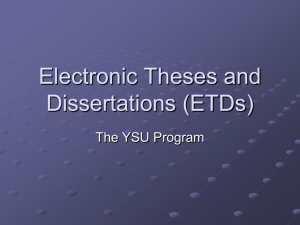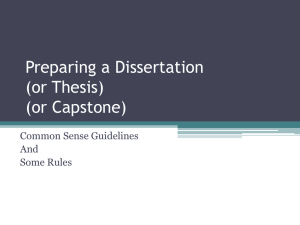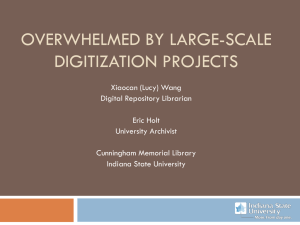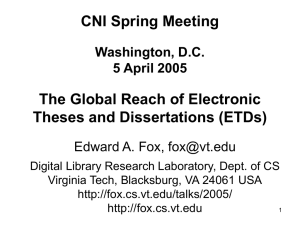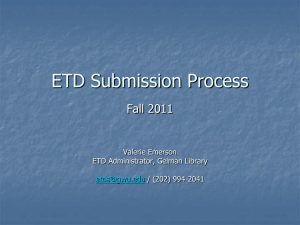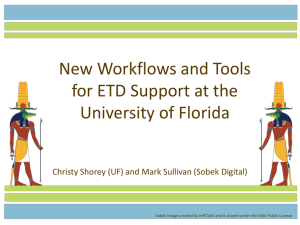Minister for Education and Training`s Response to the
advertisement
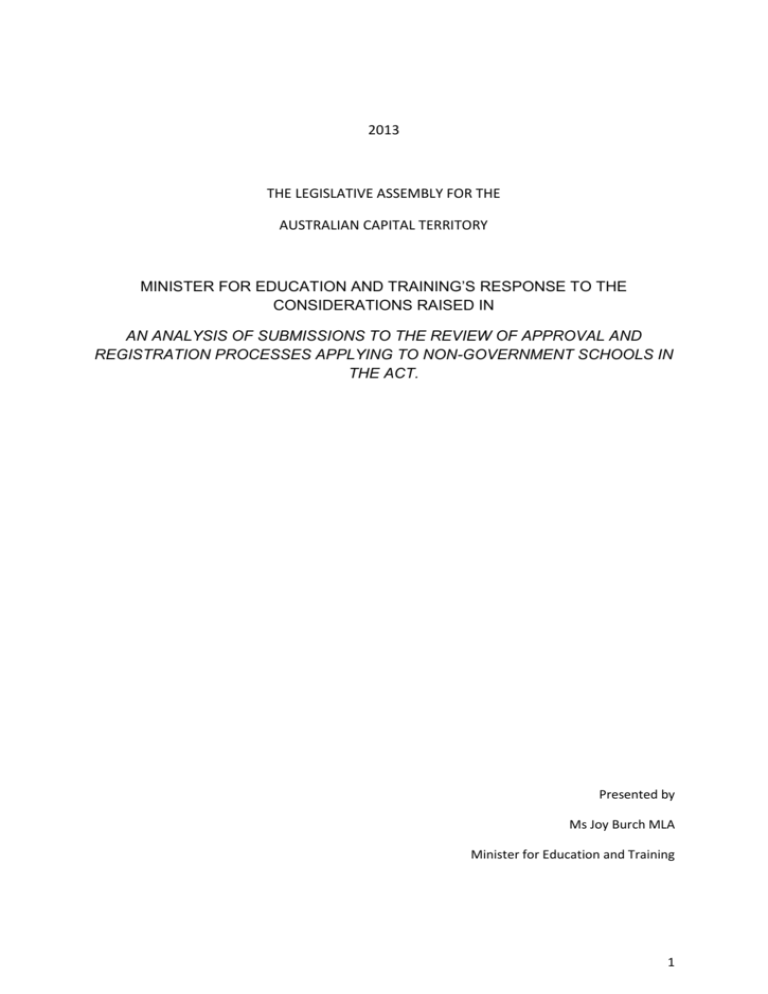
2013 THE LEGISLATIVE ASSEMBLY FOR THE AUSTRALIAN CAPITAL TERRITORY MINISTER FOR EDUCATION AND TRAINING’S RESPONSE TO THE CONSIDERATIONS RAISED IN AN ANALYSIS OF SUBMISSIONS TO THE REVIEW OF APPROVAL AND REGISTRATION PROCESSES APPLYING TO NON-GOVERNMENT SCHOOLS IN THE ACT. Presented by Ms Joy Burch MLA Minister for Education and Training 1 An Analysis of Submissions to the Review of Approval and Registration Processes Applying to Non-Government Schools in the Act. Government Response Overview Considerations Planning 1.1 If the Education and Training Directorate (ETD) manual was amended to require organisations to state the specific location of a proposed school or additional campus in their in-principle application, this would provide greater transparency and facilitate more authentic consultation. 1.2 In addition it would be beneficial if the Planning and Land Authority (PLA) were to communicate directly with interested non-government education providers, ETD and peak education support bodies, when consultation will be held about potential school sites identified in new or revised master plans; and, it would increase transparency, if the Land Development Agency (LDA) were to formally advise other education providers when a nongovernment school organisation is seeking to acquire a specific block of land to nominate in their in-principle application. 1.3 If the ETD manual was amended to provide a more specific focus on ‘overview planning’ of schooling options, (i.e. the capacity for a range and diversity of educational provision within a particular region or area of the ACT), when in-principle and initial registration applications are submitted and during the community consultation process, then more strategic planning would be facilitated. Community Demand 2.1 If the ETD manual was amended to expand on the importance of considering the potential enrolment and financial impacts on existing schools with the establishment of new schools, campuses or additional levels, this would assist in evaluating the need for a new facility. Additionally, it may also be beneficial if the manual were to be more specific about the hard, quantifiable evidence required to validate the number of prospective enrolments, the level of community interest, and the longer term enrolment projections provided by applicants applying for in-principle approval and registration. Communication/ Consultation 3.1 Communication and openness would be enhanced if the ETD manual was to be amended to require schools to post their registration/re-registration panel reports on their own school websites, as is the practice with annual reports, with the proviso that matters of high sensitivity or confidentiality, or those pertaining to commercial-in-confidence issues, are omissible. 3.2 If the recently enhanced ETD communication and public access strategies relating to applications for in-principle approval and registration were included in the Education Act and the ETD manual, this would provide greater community awareness and confidence about these changes. In addition, if the ETD could also consider other ways of making the communication/consultation processes more ‘active’, this would also be seen a positive move. 3.3 If the Minister’s decision was formally communicated to community members who made written comment on an application for in-principle approval or registration, it may have the effect of enhancing public relations. It may also enhance communication if the Minister’s decision was posted on the ETD website. These ETD manual could be amended to reflect these changes if they were implemented. 3.4 It would be appropriate if the ETD manual was amended to state that the peak education bodies - the Catholic Education Office (CEO), Association of Independent Schools (AIS), Government Schools Education Council (GSEC), Non-government Schools Education Council (NGSEC) – will all be formally advised about an application for a new non-government school in the ACT, as a matter of course, and that each will have the opportunity to seek further information and, if needed, seek a formal consultation meeting with representatives of ETD. Response Support inprinciple Support inprinciple Support inprinciple Support Support Support in part Support in part Support in part 2 Panels 4.1 It may assist in addressing any perceptions of bias or conflict of interest if the ETD manual was made more explicit about panel membership. For example: that there is no overrepresentation of the school sector or religious body involved; that the chair of the panel is impartial; that the procedures undertaken by panels are transparent and their findings are evidence-based and able to be validated. These conditions could also apply to panels considering proposals for additional Catholic systemic schools or additional levels or campuses for existing systemic schools. 4.2 If an additional panel process was established to assist the Minister (after the 60 day consultation process) to consider an application in light of the community comment received, and to provide advice to the Minister to assist her decision-making, it may have the effect of raising standards and increasing rigour. (For example, a small, high level representative panel, perhaps chaired by a non-aligned independent from one of the universities, would receive the final paperwork from ETD, review the application, clarify any issues raised by the applicant, the panel, ETD officers and/or the community, and provide advice to the Minister.) This new step, if adopted, would need to be written into the ETD Manual. Regulatory Issues 5.1 If the Education Act and the ETD manual were amended to require schools through the inprinciple approval process and registration processes, to specify the number of days per year the school will be open for students of compulsory education age, it may assist in satisfying the Minister that schools are giving sufficient time to meet the educational needs of their students and the requirements of the Australian Curriculum. 5.2 The Minister, parents and the wider community may be given greater assurance that schools are safe places for all ACT students, if the Education Act and the ETD manual were amended to require schools to have in place explicit high standards, policies and programs governing child protection, student welfare and safety and pastoral care; and if principals and proprietors were required to declare any prior involvement in a school that has been deregistered or has been under investigation in relation to child welfare issues. 5.3 The Minister, parents and the wider community may be given greater assurance that each non-government school is fully complying with all regulatory and legislative requirements, if the Education Act and the ETD manual were amended to require the principal and chair of the governing body of each non-government school to certify on an annual basis that this is the case, (eg using a standard proforma). In doing so, the ongoing viability (including enrolment) of the school would also be affirmed. Appeal Rights 6.1 If a prescribed process for submitting a formal objection (prior to the Minister’s decision) was instigated, it may provide the public with greater assurance that a rigorous consultation process is being undertaken and would ensure that potentially affected parties have an opportunity to voice their objection to a proposal within the specified timeframe. This procedure would need to be addressed in the ETD Manual General 7.1 Both the ETD manual, and the Memorandum of Understanding (MOU) with the CEO, would benefit from scrutiny by the Government Solicitor to ensure absolute consistency with the Education Act. Support Support inprinciple Support Support Support Support Support 3 BACKGROUND The Australian Capital Territory's non-government school sector consists of schools from a range of educational and/or religious philosophies. As at November 2013 there are 44 non-government schools operating on 50 campuses across the ACT. ACT non-government schools are registered in accordance with the Education Act 2004 (the Act). The Act requires non-government schools to be registered or provisionally registered before operating as a school or commencing education of a child at any educational level. Before a school can apply for registration of a new non-government school or the expansion of an existing school, the proprietor must apply for and receive in-principle approval for the proposed registration type. Registration of a new non-government school involves: 1. in-principle approval for the development of a new school 2. provisional registration 3. initial registration. Once registered, a non-government school may then apply for: 1. 2. 3. 4. 5. in-principle approval for the development of new educational (year) level/s registration at additional educational level/s in-principle approval for the development of a new campus registration at an additional campus renewal of registration. Requirements for the approval and registration of non-government schools in the ACT are detailed in Registration of Non-government Schools in the ACT – a guide for applicants, proprietors, principals and registration coordinators (Directorate’s Manual). A Memorandum of Understanding (MOU) currently exists between Directorate and the Catholic Education Office (CEO). This MOU places the management of registration renewal for Catholic systemic schools with the CEO and defines the makeup of its panels. Following the in-principle approval in 2012 of three proposals for new or expanding non-government schools, significant community interest was noted in the approval and registration processes of non-government schools. In response to this interest, the Minister for Education and Training: instituted a number of communication changes to better support community members to provide written comments on applications for the in-principle approval of new or expanding non-government schools invited education stakeholders to comment on the existing processes for approving and registering non-government schools appointed a panel of experienced educational leaders to analyse the stakeholder comments and develop some considerations for change. The panel’s review findings An Analysis of Submissions to the Review of Approval and Registration Processes Applying to Non-Government Schools in the ACT included 15 considerations across six broad themes and one general theme. This report presents the Minister for Education and Training’s response to these considerations. 4 1. PLANNING The following planning considerations do not fall into my portfolio responsibilities. Initial discussions have been held between the Education and Training Directorate (the Directorate) and the Economic Development (EDD) and Environment and Sustainable Development Directorates (ESDD) about planning for schools in the ACT, including potential sites for non-government schools in the new development areas. There will be a range of issues that will need to be considered to ensure future school developments meet the needs of the growing ACT community and the following review considerations. CONSIDERATION 1.1 If the ETD manual was amended to require organisations to state the specific location of a proposed school or additional campus in their in-principle application, this would provide greater transparency and facilitate more authentic consultation. Support in-principle As I note that schools may not be in a position to purchase land or lease premises until in-principle approval is given, I have asked the Directorate to work with EDD and ESDD to consider the implications of this consideration and to make changes to the guiding documentation. CONSIDERATION 1.2 In addition it would be beneficial if the PLA were to communicate directly with interested nongovernment education providers, ETD and peak education support bodies, when consultation will be held about potential school sites identified in new or revised master plans; and, it would increase transparency, if the LDA were to formally advise other education providers when a non-government school organisation is seeking to acquire a specific block of land to nominate in their in-principle application. Support in-principle I have asked the Directorate to work with all relevant directorates to consider the implications of this consideration. The Directorate will also work to ensure all potential non-government school proprietors or representative bodies are included in the Territory’s communication activities. CONSIDERATION 1.3 If the ETD manual was amended to provide a more specific focus on ‘overview planning’ of schooling options, (i.e. the capacity for a range and diversity of educational provision within a particular region or area of the ACT), when in-principle and initial registration applications are submitted and during the community consultation process, then more strategic planning would be facilitated. Support in-principle I have asked the Directorate to: work with other directorates to ensure future overview planning of schooling options is appropriately developed and made available to the public 5 ensure a link to this documentation is included in its manual. 2. COMMUNITY DEMAND While the panel’s suggestion to improve the quantifiable evidence of community demand in-principle approval applications is welcomed; I note that the panel has applied this suggestion to registration processes. Registration processes do not require evidence of community demand as they are an on-going regulatory compliance process against set criteria. CONSIDERATION 2.1 If the ETD manual was amended to expand on the importance of considering the potential enrolment and financial impacts on existing schools with the establishment of new schools, campuses or additional levels, this would assist in evaluating the need for a new facility. Additionally, it may also be beneficial if the manual were to be more specific about the hard, quantifiable evidence required to validate the number of prospective enrolments, the level of community interest, and the longer term enrolment projections provided by applicants applying for in-principle approval and registration. Support I have asked the Directorate to: identify the evidence required to demonstrate community demand for proposals for new non-government schools, or additional campuses or educational levels at existing non-government schools amend its manual to reflect the findings. 3. COMMUNICATION / CONSULTATION Considerations 3.2 and 3.3 of the review infer that the non-government schools registration processes require public comment. Public comment is already required and essential to the in-principle approval process for new non-government schools or developments. Registration processes do not require public comment as they are an on-going regulatory compliance process against set criteria. CONSIDERATION 3.1 Communication and openness would be enhanced if the ETD manual was to be amended to require schools to post their registration/re-registration panel reports on their own school websites, as is the practice with annual reports, with the proviso that matters of high sensitivity or confidentiality, or those pertaining to commercial-in-confidence issues, are omissible. Support I have asked the Directorate to amend its manual to require non-government schools to post their registration reports on their own websites. CONSIDERATION 3.2 If the recently enhanced ETD communication and public access strategies relating to applications for in-principle approval and registration were included in the Education Act and the ETD manual, this would provide greater community awareness and confidence about these changes. In addition, if the ETD could also consider other ways of making the communication/consultation processes more ‘active’, this would also be seen a positive move. Support in part 6 I have asked the Directorate to: review and improve the current communication strategies make changes to the guiding documentation to implement the improved communication strategies explore how the Queensland requirements for non-government school applicants to notify and consult with the community about proposed developments might work in the ACT consider the implications of this consideration and to identify what changes would be required. CONSIDERATION 3.3 If the Minister’s decision was formally communicated to community members who made written comment on an application for in-principle approval or registration, it may have the effect of enhancing public relations. It may also enhance communication if the Minister’s decision was posted on the ETD website. These ETD manual could be amended to reflect these changes if they were implemented. Support in part In-principle approval Public comment is already required and essential to the in-principle approval process for new non-government schools or expansions of existing non-government schools. I have asked the Directorate to: communicate my decision about applications for in-principle approval to community members who made written comment on the application make changes to the guiding documentation to implement the improved communication strategies. Registration Registration processes do not require public comment as they are an on-going regulatory compliance process against set criteria. As Minister, my decisions to register a non-government school or cancel its registration, is informed by a panel report on the school’s compliance. The consideration of community comments is more appropriately managed by each non-government school according to its community engagement strategies or required complaints handling process. CONSIDERATION 3.4 It would be appropriate if the ETD manual was amended to state that the peak education bodies the CEO, AIS, GSEC, NGSEC – will all be formally advised about an application for a new nongovernment school in the ACT, as a matter of course, and that each will have the opportunity to seek further information and, if needed, seek a formal consultation meeting with representatives of ETD. Support I have asked the Directorate to: formally advise the Government Schools Education Council (GSEC) and Non-government schools Education Council (NGSEC),which includes representatives of key education stakeholder groups, of applications for in-principle approval for new or expanding non-government schools 7 invite GSEC and NGSEC to make comment on the applications within the consultation period currently stipulated in the Act make changes to guiding documentation. 4. PANELS Consideration 4.1 of the review infers that the processes for the registration of additional educational levels or campuses for existing non-government schools, differs between Catholic systemic and Independent schools. The only difference in registration processes is that the registration renewal of Catholic systemic schools is managed by the CEO. CONSIDERATION 4.1 It may assist in addressing any perceptions of bias or conflict of interest if the ETD manual was made more explicit about panel membership. For example: that there is no over-representation of the school sector or religious body involved; that the chair of the panel is impartial; that the procedures undertaken by panels are transparent and their findings are evidence-based and able to be validated. These conditions could also apply to panels considering proposals for additional Catholic systemic schools or additional levels or campuses for existing systemic schools. Support I have asked the Directorate to develop ways to align aspects of the external validation of public schools and the registration of non-government schools. I have also asked the Directorate to develop a definition for impartiality as it would apply to all members of registration or validation panels. The Directorate will negotiate with the CEO the implications of this consideration on the existing MOU. CONSIDERATION 4.2 If an additional panel process was established to assist the Minister (after the 60 day consultation process) to consider an application in light of the community comment received, and to provide advice to the Minister to assist her decision-making, it may have the effect of raising standards and increasing rigour. (For example, a small, high level representative panel, perhaps chaired by a nonaligned independent from one of the universities, would receive the final paperwork from ETD, review the application, clarify any issues raised by the applicant, the panel, ETD officers and/or the community, and provide advice to the Minister.) This new step, if adopted, would need to be written into the ETD Manual. Support in-principle I have asked the Directorate to make changes to the guiding documentation to include provision for the Minister to seek further advice when making a decision in response to applications for in-principle approval. 8 5. REGULATORY ISSUES Considerations 5.1, 5.2 and 5.3 will require appropriate investigation to determine if these considerations will require amendments to the legislation or amendments to the Directorate’s nongovernment education Manual and its policies relating to public schools. CONSIDERATION 5.1 If the Education Act and the ETD manual were amended to require schools through the in-principle approval process and registration processes, to specify the number of days per year the school will be open for students of compulsory education age, it may assist in satisfying the Minister that schools are giving sufficient time to meet the educational needs of their students and the requirements of the Australian Curriculum. Support I have asked the Directorate to: work with all ACT school sectors to determine a minimum number of days per year for classes reflect these requirements in the guiding documentation. CONSIDERATION 5.2 The Minister, parents and the wider community may be given greater assurance that schools are safe places for all ACT students, if the Education Act and the ETD manual were amended to require schools to have in place explicit high standards, policies and programs governing child protection, student welfare and safety and pastoral care; and if principals and proprietors were required to declare any prior involvement in a school that has been deregistered or has been under investigation in relation to child welfare issues. Support I have asked the Directorate to make explicit the policies and programs relating to child protection, student welfare and safety and pastoral care required for all ACT schools. The Directorate will reflect changes in its manual. CONSIDERATION 5.3 The Minister, parents and the wider community may be given greater assurance that each nongovernment school is fully complying with all regulatory and legislative requirements, if the Education Act and the ETD manual were amended to require the principal and chair of the governing body of each non-government school to certify on an annual basis that this is the case, (eg using a standard proforma). In doing so, the ongoing viability (including enrolment) of the school would also be affirmed. Support I have asked the Directorate to: identify how annual certification of compliance with legislation and registration criteria, might be included in existing reporting methods such as each school’s Annual Report which is required by the Commonwealth to be placed on the school’s website. reflect changes the guiding documentation. 9 6. APPEAL RIGHTS CONSIDERATION 6.1 If a prescribed process for submitting a formal objection (prior to the Minister’s decision) was instigated, it may provide the public with greater assurance that a rigorous consultation process is being undertaken and would ensure that potentially affected parties have an opportunity to voice their objection to a proposal within the specified timeframe. This procedure would need to be addressed in the ETD Manual Support The current processes for in-principle approval already provide opportunities for members of the community to have their comments, either supporting or objecting to the application, considered as part of the decision making process. As noted in my response to Consideration 4.2 I have asked the Directorate to strengthen this process by making changes to the guiding documentation to include provision for the Minister to seek further advice when making a decision in response to applications for in-principle approval. 7. GENERAL CONSIDERATION 7.1 Both the ETD manual, and the MOU with the CEO, would benefit from scrutiny by the Government Solicitor to ensure absolute consistency with the Education Act. Support I have asked the Directorate to ensure the next versions of its guidelines for the approval and registration of non-government schools, and the Memorandum of Understanding with the Catholic Education Office, are scrutinised by the Government Solicitor for consistency with the Act. 10

